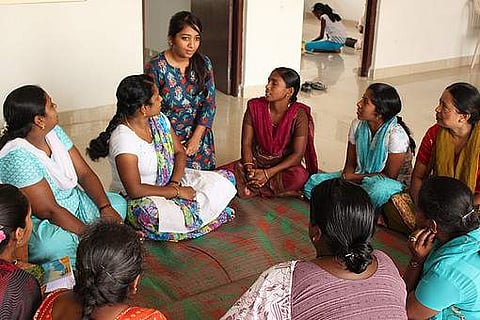

At a time when CTCs are more in demand than some TLC, it's hard to find people who work in the social sector. Well I found one such soul and it was nothing short of an inspiration to have a conversation with her. Srithi Abinitha, the Project Manager at Kirubai Project's Family Support Programme, was drawn to social work despite having an educational background in Business. “I completed my Bachelors in Management and a Masters in Social Work. I always wanted the best of both worlds - some Business experience as well as a grounding in the social sector in order to contribute towards building sustainable communities. I got the taste of corporate culture in my first job as a Human Resource coordinator. While I was pursuing my MSW I was also offered a part-time with Kirubai Project based in Bengaluru,” she says.
How did she end up handling the Family Support Programme you ask? A strong vision to reach out to impoverished children who had no able care-givers was what led to the starting of the Kirubai Project in 1999. They went on to start a children’s home in Bengaluru. While Kirubai Project was established to meet the needs of children with no care at all, other families with financial trouble wanted their children to be a part of this home as well because they didn’t have the resources to look after their children. The founders, Sunishka Carunia and Anbu Rani, then initiated a creative solution for the same - thus forming the Family Support Programme in the year 2001. In the year 2013 FSP grew to have its own systematic ways of working and appointed Srithi as their Project Manager.
Family Support Programme aims to reach out to children who are taken care of by single mothers or grandparents, providing financial aid for education and empowerment through building relationships. Building relationships is the essence of this project, letting people know that they are not alone, Srithi says, “We provide the finances each mother needs for her child’s education, but that’s not it. We ensure that we provide mental stability through counselling for every widow. We teach sustainability, we counsel mothers to work to support the family and they are also made to open a savings account for their children and deposit a sum of Rs 100 every month. This cannot be touched until advised otherwise.”
So much has improved over the years for FSP. Right now, they are in the process of training single mothers who are doing well in the programme to become leaders of their community. These mothers are also put through to workshops on parenting and budgeting for awareness. She explains, "Our biggest service would be building and maintaining relationships and helping understand that they can reach out to any of us at any point of time. These women are victims to social stigma and are often looked down upon in society. They have nowhere to go, but now they have an extended family to look up to."
And how do they find and on board families? They can get referred into the programme by any individual who is a part of the Kirubai Project network. "This is a cautionary step taken by the management to ensure the accountability factor of every FSP delegate. The referrer fills out a referral form and establishes trust with the management of FSP and is accountable for the acts of the referee. Post which a serious background check is done to verify the truths be told while applying for the programme. We prioritise widows and grantparent led homes with children," she explains.
The FSP staff often do house visits quite often as a follow up and submit reports. One of the biggest challenges they face is helping women transform themselves. Empowering is all about transforming lives for the better but if those women restrict themselves to breaking the barricades of social stigma then it makes the whole FSP idea not feasible. “We push ourselves to guide them, they come to us with their problems and I have personally given my best in finding solutions for the same and most of the time they defect from all the advice given, which is hard on them and us, we could force decisions on them, but that would be dictatorship not empowerment,” she continues
In contradiction to challenges are the success stories - and one such is the story of Prashant, who went from being a part of the broken family to being a financially independent individual and also the first to break the cycle of poverty in his family. “The very fact that FSP was able to play its vital role in educating him which in turn resulted in him being a very successful individual in itself is a testimony to empowerment and transformation of lives,” Srithi adds.
